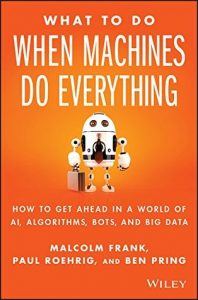Throw Away the Books and Listen: It’s Time To Get Real about the Digital Era
Video Transcript
AI has left the silver screen and is now everywhere. It is in your pocket and on your washing machine. It is in your car and writing the news you read online. AI is constantly displacing old technology and ways of doing things, but will it stop there? No, it will not. I know what you are thinking; Will AI displace me? How do I get ahead in this automated era? WHAT DO I DO ROSS?!?
I’ll tell you what to do read What to Do When Machines Do Everything by Frank, Roehrig, and Pring. (Throw Away Book) NAH. While I wholeheartedly recommend reading this book, I realize not everyone has the time to read it, so I will do my best in the next few minutes to share some key points and ideas that I believe can help you get ahead in this age of bots and machines.
As I hinted at earlier, WTDWMDE is about how to best position yourself and/or your organization in the 4th industrial revolution. Basically, it is a survival guide for our ever-changing digital world. The book starts by first addressing the reason for its own existence, we are at the beginning of a brand new digital age that will change the way we live in this world and then proceeds to take the reader through a series of chapters on things like incorporating the new machine into your organization, how to utilize data to best meet your needs, and most importantly adapting your mindset from fixed to growth to innovate yourself a place in the new era.
Now, I know what you are thinking, he promised us some key points to help us get ahead. Don’t worry I didn’t forget about you.
Key Point number 1: There will be blood. Unfortunately, with any industrial revolution, there is a cost. It is predicted that 19 million jobs will be displaced by AI alone in the next ten years. And this doesn’t even include jobs replaced by regular machines or unforeseen innovations. Jobs at risk will be those that consist of repetitive tasks and manual labor but the displacement does not stop there. Notable industries to be hit will be the financial sector due to automation of accounting, transportation due to driverless vehicles, and healthcare due to AI based information collection systems. But, there is a silver lining, over 21 million jobs are predicted to be created by 2025 solely thanks to the same automation. Not only that but this same technology can increase productivity and reduce costs so that goods and services can be available to more of the population
Key Point number 2: Data is the key to success. When we here the word data, we think of companies like Amazon and Facebook advertisements that seem to follow you everywhere, and our cell phone plans. But Data isn’t just some obscure thing that only big companies or tech wizards can take advantage of, it is a resource that can put you a step ahead. A great thing about data is that it is cheap to mine or collect. Crowdsourcing is a good way to collect data that relies on user feedback and ratings to help companies see trends and monitor product reception. Data can also be collected through built-in software or third party applications. Another great thing about data is that Data’s value grows over time and exponentially as more is collected. There is an old rule in statistics that doing a hundred more trials gives you ten times the accuracy in results and this is true for data as well. The more data you have, the more you know and the better calculated your next decisions can be. Data also helps you understand the behaviors of people in a way that a business can take advantage of. Examples include getting rid of automatable tasks and being able to react quickly to changes in the market that a human being may take months to notice. It also makes interactions with these technologies more human as user experience can be continuously improved through data collection.
Key Point number 3: Automation Encourages innovation. Automation of much of the menial or manual tasks in someone’s day gives them more time to devote to other work that requires more thinking. This will be extremely beneficial to Technicians, engineers, physicians, design thinkers, and financial advisors to spend more time focusing on human interaction with clients, patients, customers, etc. And as a bonus, his extra time could be used for more collaboration and ideation. If productivity is higher, then more time can be left to developing new ideas or concepts without fear of holding oneself or a company back.
So, how do I prepare myself for this new digital frontier? That depends on the person, but I can tell you what I plan to do.
To be successful in this new age I need to be driven. To avoid displacement I must work hard and constantly strive to innovate and improve myself. I must never let my thought process become fixed and be open to the changes brought about by the exponential pervasiveness of new technology. I must study hard and work to understand how to utilizes resources like AI and the data it collects to best benefit my work and works towards my goals. This means constant learning both in and out of the classroom is necessary to gain the knowledge and experience necessary. Also, I must learn to communicate my ideas effectively to make the most of the age of thought and ideation that will spring from the time given by automation.

Throw Away the Books and Listen: It’s Time To Get Real about the Digital Era
What To Do When Machines Do Everything: How to Get Ahead in a World of AI, Algorithms, Bots, and Big Data, by Frank, Roehring, and Pring, is a pragmatic but positive look at the future of Digital Transformation with respect to automation and integration of AI into our daily personal and working lives. The book opens by first addressing Digital Transformation and what it looks like for us, as well as the trends and behaviors we are currently seeing in the world. After helping the reader achieve a general understanding of this, the book then turns to how you or your organization can utilize data and new technology to meet your needs and find a niche. The book also focuses heavily on the importance of shifting one’s mindset from fixed to growth in order to give you the highest likelihood of innovating a position in the new era.
Personally, for me, it was an outstanding book simply because it took a positive outlook on the future. I am very much of the same opinion that new technology and automation/AI are the keys to solving some of our most pressing problems (ie. Climate Change) and reaching a true “golden age” within society. This book renewed my drive to learn more about technology and how I can best use it to improve my knowledge and skill set. I wholeheartedly recommend this book to anyone who is looking to grow not only in their technical knowledge but also in their understanding of economics and how people behave, think, and respond to change.

Ross Cortino
Member of Cohort 7 of the Lockheed Martin Leadership Institute
View Biography
Ross Cortino is an Electrical Engineering Major with a Minor in Computer Science. He is currently pursuing another minor in Mechanical Engineering so that he can reach his goal of attending graduate school to study Robotics. Ross’s goal is to be in the business of R&D for robots and other technologies that can be used for healthcare and personal use; at the end of the day, he hopes to make everyone’s lives just a bit easier. He has been working with the Lockheed Martin Leadership Institute to develop and maintain the skills necessary to not only be successful in his desired field but also to grow in the soft skills that are necessary for engineers industry. Additionally, he is currently the President of Miami University’s Chapter of Theta Tau, a national professional engineering fraternity, which has also been instrumental in his growth as a leader and a person. Ross is also involved in IEEE HKN, a member of the Baja SAE, and the Miami University Center of Assistive Technology through research. In his free time, Ross enjoys building computers, reading books, and playing music on his guitar or piano.
Currently, as part of his studies with the Leadership Institute, Ross is involved in a year-long project focused on digital transformation. As a member of the Content team, he is actively involved with planning the videos and other information on this site as well as interviewing speakers for many of the videos in the digital speaker series. Ross has also spent the last several months creating content on basic terminology to help the newcomer understand the initial complexity of digital transformation. His goal is to not only grow in his ability to communicate through these experiences but also to be a source of information that his and past generations can rely on to guide them through this next significant phase in our society.
